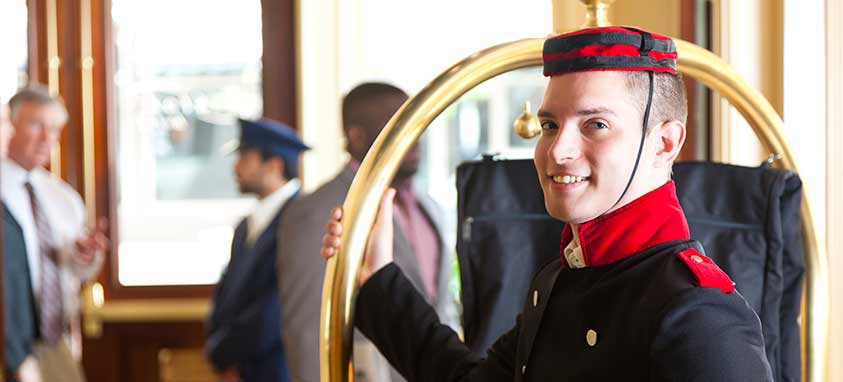Plan to reward service that goes above and beyond
If all the things that planners must address before, during and after a meeting or event, there’s one seemingly small element that often causes uncertainty: gratuities for frontline service staff. For instance, some planners might simply look at the service charge that’s added to a food and beverage bill and think that amount will be passed along to the people who worked the event. But this is frequently not the case. Of the amount that a property adds as a service charge—which is generally between 18 and 25 percent of the pretax bill—it’s likely that only part of it goes to the people who worked the function. It’s entirely possible that none of it goes to them.
As a result, many planners build a line item into their event budgets for cash gratuities that recognize outstanding service from employees, not just in F&B but in other areas, too.
According to Jennifer Vecchi, director of the MICE division for Massachusetts-based Atlas Travel, Meetings and Incentives, “The gratuities we give after a meeting are for what we consider above and beyond service, and the property’s service charge for various events has no bearing on how we handle this.”
Terri M. Utecht, president of Utecht Diversified Events in Arvada, Colorado, and president of the Meeting Professionals International Rocky Mountain Chapter, notes that she tries to negotiate the service charge for F&B events down by 1 or 2 percent in order to budget for gratuities that she gives hospitality staff members.
“In my experience, little of that goes to the service staff,” Utecht says. “Gratuities, then, are very important for planners to consider in order to recognize exceptional work. We distribute cash gratuities to frontline people from any department who go beyond their expected job duties and make a difference in our event experience.”
Preparing the Ground
When negotiating a meeting contract with a resort, Vecchi makes sure to find out exactly what is included in the daily resort fee that’s added to each guest room. If a housekeeping gratuity is part of that fee, her information packet will highlight that so attendees do not leave their own gratuities. Some high-end meetings and incentives will also take care of gratuities for bellhops, though this is more often left to each attendee, depending on usage. Communicating to attendees which elements of the meeting experience have gratuities already built in, and recommending to them the proper gratuity amounts for the other services they use helps to eliminate confusion and awkwardness during events.
To motivate the property staff to deliver outstanding service during events, Utecht delivers a message through her convention services contact at the precon session. “I tell my contact that this is a group that really responds well when people go the extra mile to make sure things go well,” Utecht says. “We like to take care of people who take care of us. I also mention that he or she is free to pass that information along.”
Once the meeting begins, Vecchi and Utecht direct their staffers to keep a sharp eye for service employees who are engaging, proactive and speedy as they provide assistance inside and outside the meeting space. “When someone does something above and beyond what they had to do, we write down their name and create an envelope for them,” Vecchi says. “However, we don’t give the envelopes out until the end of the meeting. Because you often have the same people working with the group over several days, someone might do something exceptionally well on the first night but then do something badly the following night.”
Here are a few examples of above-and-beyond service that Vecchi and Utecht have seen at recent events:
-A bellhop carried 20 shipping boxes of welcome gifts from a van to a staging area, then unboxed the gifts and delivered them to every attendee’s guest room by himself.
-An audiovisual person spent the entire meeting at the control board, troubleshooting problems while making suggestions on the fly to improve the attendee experience.
-A housekeeper drove an attendee’s spouse from the hotel to the hospital after her shift ended, for three consecutive days because the attendee had an appendix attack on the meeting’s first day.
Delivering the Goods
With people who do their job as expected during a meeting, “we’re happy and we send them a handwritten thank-you note,” Utecht says. “But for the people who did their job and then some, we will also put in anywhere from $20 to $150, depending on what they did and how often they did it.” In her own thank-you notes, Vecchi makes sure to detail exactly what was special about the staffer’s effort to reinforce the behavior. She also delivers all the envelopes to her convention services manager, who must sign for them so that there are no discrepancies regarding which staffers received which gratuity amounts.
“Every service person plays a vital role in the quality of the meeting experience, right down to the bellhops and housekeepers,” Utecht says. “It’s so important for planners to recognize outstanding efforts so that we all receive more of that on a regular basis.” For planners who have a multiyear contract at a property, using gratuities to recognize excellent effort this year will most likely contribute to having an even better meeting next year. Positive reinforcement goes a long, so it’s crucial to understand gratuities.




